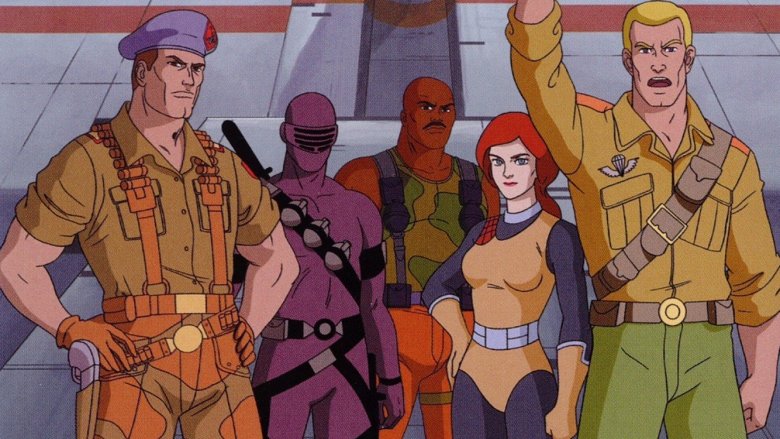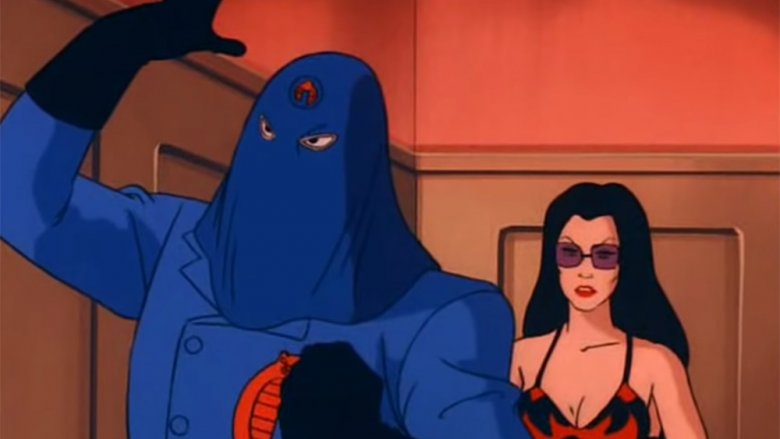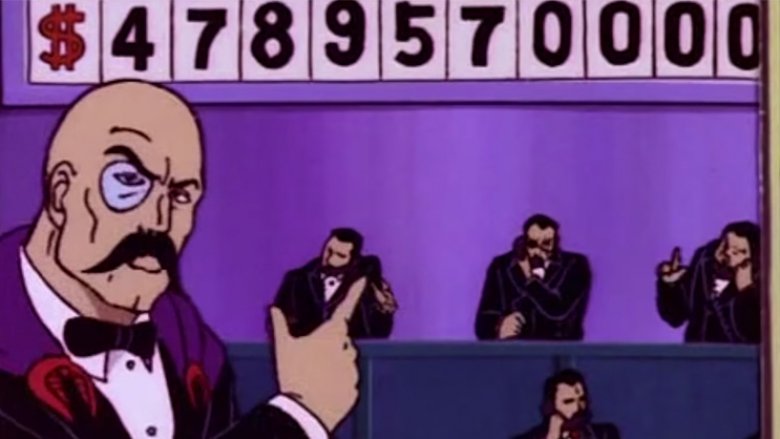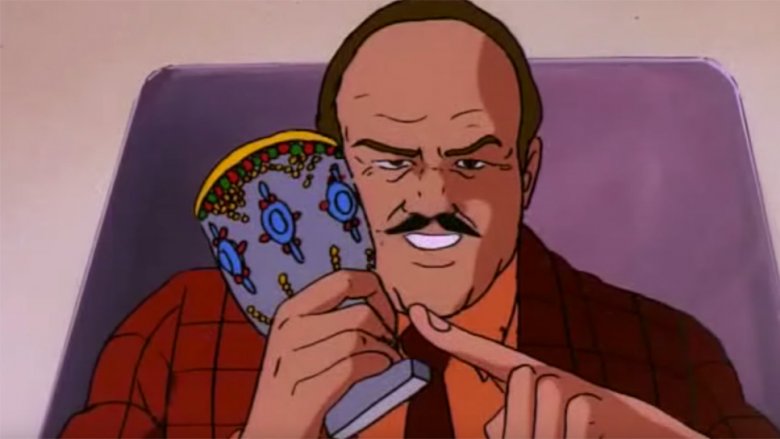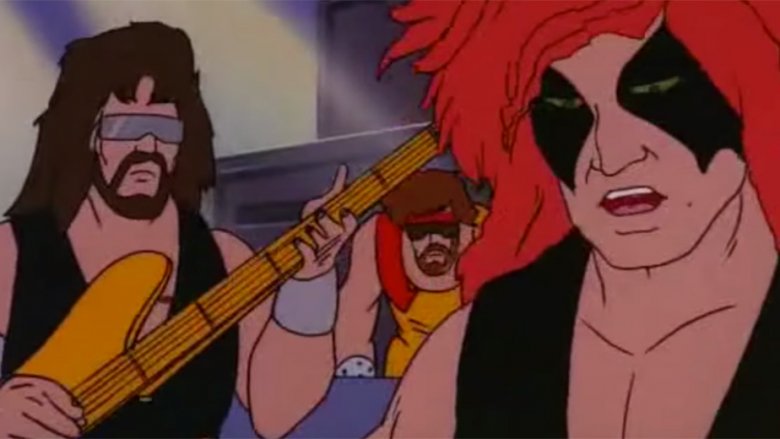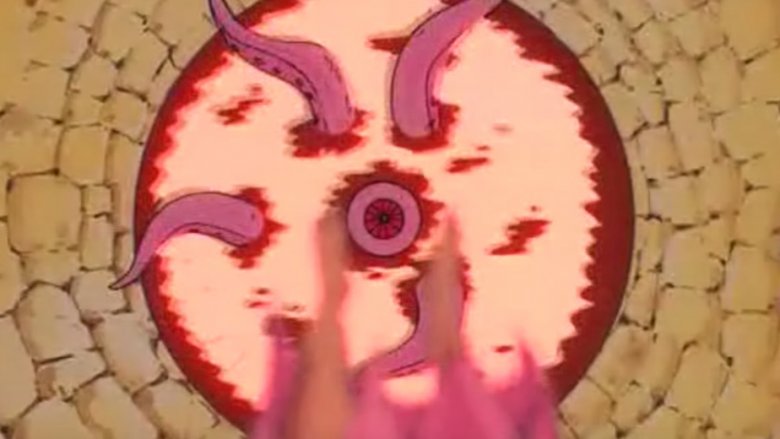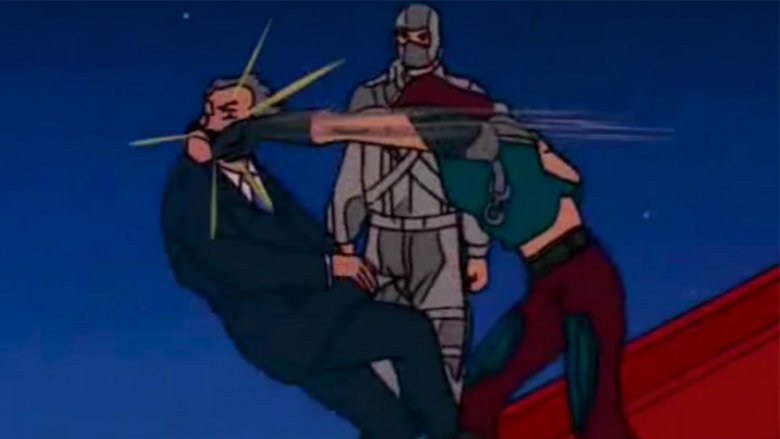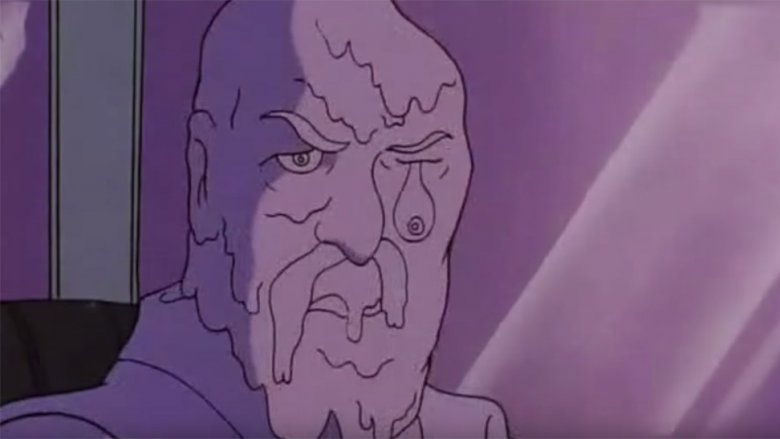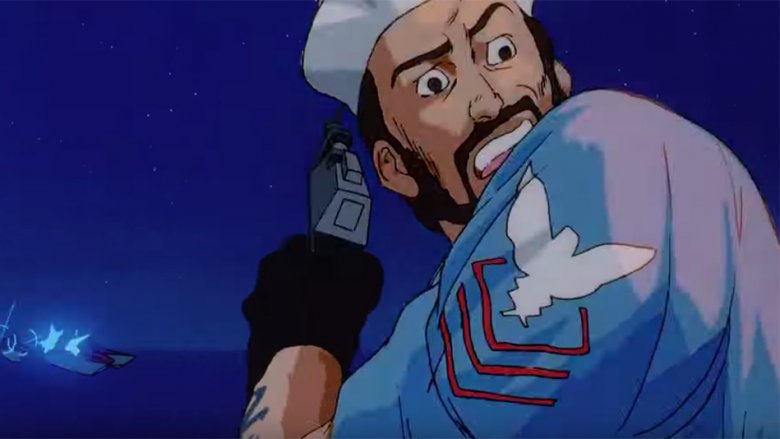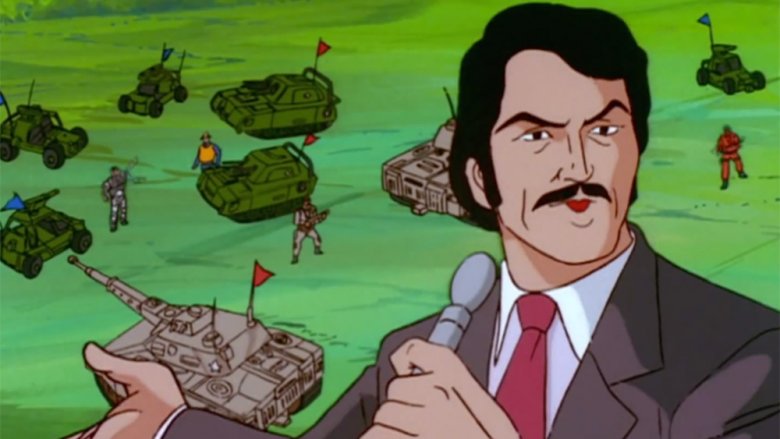Things Only Adults Notice In G.I. Joe
In the early '80s, the toy company Hasbro dusted off a line of military dolls with realistic hair and kung-fu grips, shrunk them down to three and three-quarter inches, and kicked off a full-on, cross-media franchise as G.I. Joe: A Real American Hero. There was a massive line of action figures and playsets that included an aircraft carrier the size of a coffee table, a long-running, hugely popular series from Marvel Comics, and — thanks to a change in FCC regulations that meant companies could basically air half-hour commercials for their toys as long as they had at least some semblance of a plot — an animated series that racked up nearly 100 episodes and a full-length movie.
All together, that resulted in a whole lot of nostalgia fuel. When the kids who were obsessed with Duke, Snake Eyes, and Scarlett went back to those cartoons as adults, however, they found that there were things going on in that cartoon that they definitely didn't notice as kids. From the stuff that's better than you remember to the episodes that are just plain weird, here are the things only adults notice in G.I. Joe.
Only adults notice Cobra's fantastic benefits
The opening credits of every episode of G.I. Joe describe Cobra as "a ruthless terrorist organization determined to rule the world," but when you go back to the show as an adult, it's easy to see them as a little less "terrorist" and a little more "corporate America." Sure, they occasionally pull off schemes like, say, building a machine that will literally burn up all the money in the world or stashing nuclear missiles at fast food restaurants, but structurally speaking, they have more in common with Amazon than ISIS.
That mostly comes through in the comics, where we learn that Cobra Commander got his start basically running a pyramid scheme, and lured potential sleeper agents into joining his cause by offering competitive salaries and even health insurance, complete with a dental plan. Of course, the dentistry had to be done by Dr. Mindbender, whose standard uniform of cape, giant metal codpiece, and zero shirts might make you reconsider getting treatment for all but the most painful toothaches, but benefits are benefits, folks. The cartoon, however, follows along, and the glimpses that we get of Cobra Corporate show that they actually treat their employees way better than the good guys do.
Take "The Viper Is Coming," for instance, an episode based on the classic playground joke of receiving an ominous phone call informing you that "the viper is coming," only for a friendly, heavily accented maintenance man to show up to "vipe the vindows." While the Joes scramble around trying to locate the mysterious "Viper," they wind up uncovering a secret Cobra facility at the South Pole devoted entirely to recreation. Cobra's soldiers are allowed to swim and play table tennis in the Cobra Commander Gymnasium, grab a meal at the Destro Dining Room, and even catch a performance by a dance company called the Cobra Cuties. It's so thoroughly pleasant that it's kind of easy to see why so many people could get past the whole "overthrow America" thing.
Cobra is constantly battling the budget
Referring to Cobra as in any way "realistic" is a pretty huge stretch, but there is one aspect of the organization that seems pretty authentic: They're always broke. It makes sense that they would be, too. HISS Tanks and Weather Dominators don't come cheap.
The thing is, you never really see Mumm-Ra or the Decepticons having to figure out their budgets. With Cobra, it's what they're doing most of the time. Sinister plots like the attempted robbery of Fort Knox — which seems a little counter-productive since it requires the construction of their own bullet train, a massive public works project that would've set them back billions — are all about securing funding for other, even more improbable plots.
By the time the show gets to the latter half of its second season, things are getting so dire for Cobra that they're forced to have a straight-up telethon where they beg for donations from the rest of the international terrorist community. When you're watching Destro having to put on a cheap tuxedo and awkwardly beg vaguely offensive stereotypes for charity, you know things have gotten pretty rough.
G.I. Joe has some weird things to say about states' rights
Speaking of Cobra's increasingly improbable fundraising tactics, one of their more audacious schemes came when they attempted to steal the entire state of Alaska.
It happens in the appropriately titled episode "The Great Alaskan Land Rush," which revolves around Cobra discovering an obscure provision in William Seward's purchase of Alaska from Russia in 1867, which the show refers to as a treaty. The big idea is that whoever has the state seal of Alaska — which is a big jewel-encrusted chalice — is the state's true owner, so Cobra gets their hands on a passable fake and then declares ownership of the state. As a kid, when your entire life is governed by seemingly arbitrary rules about nap time and chores, this makes perfect sense.
As an adult, however, this doesn't seem like a well-considered plan. You may already know this from the entirety of history, but claiming ownership of a massive chunk of land that has been considered to be part of another country for 120 years is slightly more difficult than just showing up with a fancy teacup. No matter how nice your accessories are, that tends to prompt things like massive direct military action that goes a lot further than just sending four dudes with laser guns to chase you around the tundra for 20 minutes. On the other hand, it does evoke a National Treasure-style vault full of 50 items that the government has to keep around in order to maintain the union. "Whosoever holds this 'Punk in Drublic' tank top, if they be worthy, shall possess the state of Florida!"
Cold Slither is the world's worst band
Believe it or not, the attempt to Ocean's Eleven 663,000 square miles of the Pacific Northwest is not Cobra's most ridiculous plot. That dubious honor would likely go to "Cold Slither," the episode about a band named Cold Slither and their hit song, "Cold Slither."
For the kids in the audience, this might seem like one of Cobra's more deviously subtle plans for world domination. The bad guys disguise the Dreadnoks as a hair metal band and use an evil supercomputer to lace their music with mind-controlling subliminal messages that hypnotize their listeners into absolute obedience to Cobra. On paper, this is a pretty good plan, and it even works on a couple of the ridiculously loyal, eternally patriotic Joes, who become mindless zombies after about four seconds of listening to it, leaving the rest of the team to puzzle through the mystery of why they've suddenly got a handful of traitors on their hands.
Once you grow up and revisit the episode, however — and you should, because it's still pretty awesome — the plot isn't quite as covert as it seemed the first time around. For one thing, the Dreadnoks already kind of look like a hair metal band, so dressing them up as a slightly different hair metal band is not the best disguise. Second, and probably more importantly, "Cold Slither" is about as subliminal as a brick to the head. The actual, explicit lyrics of the song include, "We're Cold Slither, you'll be joining us soon / A band of vipers playing our tune," and in case that one was a little too subtle, there's also, "Too late to resist, 'cause Cobra is strong." Freedom of expression is obviously very important, but if Taylor Swift dropped a hot new track about how listeners should swear loyalty to a terrorist organization, it probably wouldn't get a whole lot of radio play, and the government would likely have at least a few questions.
There's a lot of supernatural stuff happening in G.I. Joe
At heart, G.I. Joe is a franchise based around a sort of sci-fi military aesthetic. For the most part, all of the Joes' playset-ready equipment — like the A.W.E. Striker dune buggy, the M.O.B.A.T. tank, or the Sky Striker fighter jet — are all based on real-world counterparts. Cobra, on the other hand, gets a little weirder with it, but at the end of the day, Trouble Bubbles and HISS Tanks are pretty recognizable as tanks and aircraft, so everything tends to line up with the real world.
Well, until they start fighting ghosts and Cthulhu monsters, that is.
Yeah, it turns out that in the world of G.I. Joe, the supernatural is a 100 percent real problem that the United States military has to address. It's not even in some secret Area 51 sort of way, either — it happens all the time. Cobra summons ghosts to fight their battles for them, the Joes straight-up have to fight Set, the falcon-headed Egyptian god of fire, and Destro literally has gigantic, shambling, Lovecraftian horror in the basement of his ancestral home that his family has been worshiping through human sacrifice for centuries. And that's before you get to the movie and the twist that Cobra Commander was a snake-man from a hidden society of actual monsters.
If you're a kid whose major concern is whether the Nemesis Enforcer action figure is insanely rad (it is), then all this supernatural stuff works just fine. It's not until you're an adult that you start to think about how weird it is that pretty much every cartoon on TV in the Joe era dabbled in the supernatural at one point or another. Even Starscream was a ghost at one point, and that dude was an airplane, which raises a lot of metaphysical questions that the Transformers franchise didn't seem prepared to answer.
G.I. Joe has shockingly sophisticated politics
If you go back and watch an episode of a show like He-Man and the Masters of the Universe, you probably wouldn't be surprised to find that it's almost unbearably simple and padded out with recycled shots of characters just running around for no reason. After all, it's another one of those toy commercial cartoons, and since those things only had to be good enough to get kids interested in action figures, they were all kind of simplistic and bad, right? Wrong. Well, not about Masters of the Universe. That thing is pretty atrocious despite having some truly buck wild and complicated lore behind its characters.
G.I. Joe, on the other hand, could be shockingly smart and well-crafted, especially for a show that was mostly built around the premise of "good guy soldiers fight snake-themed bad guys in and around various playsets and vehicles." Just look at "Cobra's Candidate," an episode where introducing a new action figure is a secondary to teaching children that politicians are lying to you. The premise seems simple enough. Thanks to his hawkish, "law and order" platform, mayoral candidate Robert Harper has become a target for Cobra, with the Commander's minions intimidating voters and demanding that they support his bleeding heart, soft-on-crime opponent. G.I. Joe has been tasked with protecting him, which seems like a pretty standard setup. They've got to deal with Cobra meddling, and keep Harper safe long enough for him to be elected and make the city lawful again. Hooray, democracy!
Except that it actually turns out that it's Harper himself who's in bed with Cobra, and the "attacks" are just a tactic to get sympathy from voters and make him seem like he's capable of dealing with a crisis that doesn't exist, all while profiting from fear. Sure, it's a fantastical story that could never happen in real life, but as adults, we're pretty impressed by the show illustrating how democracy can be twisted by the ruthless and power hungry. Of course, no matter how old we get, we're never going to figure out why Cobra was so invested in local politics.
The show deals with some serious psychological torture
Not all of G.I. Joe's adult-oriented details have to do with goofy quirks about Cobra's budgetary shortfalls or the fact that Destro and the Baroness were 100 percent boning down every time they were not directly on screen. Some of them are downright horrifying, and the two-part saga of "There's No Place Like Springfield" contains some pure, unadulterated nightmare fuel.
While the target audience of kids in 1985 wouldn't know this, the episode was heavily inspired by the surreal 1966 British series The Prisoner, in which a former spy is confined to a mysterious island called "The Village," where he's only referred to by a number and is psychologically tortured in elaborate, occasionally dreamlike scenarios in an effort to break him and discover his secrets. You know, exactly the sort of thing you'd want to adapt into a 22-minute toy commercial for babies.
In G.I. Joe's version, scripted by famously offbeat comic book writer Steve Gerber, Shipwreck wakes up after a mission to find himself as an older man who's been retired from the Joes for years, but has no memory of the intervening time. He's confronted with both a family that he doesn't remember having and other retired Joes, some of whom blame him for Lady Jaye's death. While he suspects something is wrong with the whole scenario, it isn't until he watches his wife and children melt into puddles of goo in front of him that viewers learn the whole thing is a plot by Cobra to make him give up classified information by putting him in a village full of "synthoids." Eventually he makes it through okay, but the episode left plenty of viewers thinking about it and discovering new layers to the psychodrama as they grew to adulthood.
Not every character gets a fair shake
The extensive cast of G.I. Joe is explicitly designed to be large and inclusive enough so that every kid can have their favorite character. The big reason for this is, of course, to sell more action figures, but it has the pleasant side effect of giving the show a level of diversity that's still pretty impressive over 30 years later. (In practice, however, everybody's favorite is Snake Eyes, the badass, silent ninja who has a sword and an uzi and grenades and a pet wolf and a secret sword brother, and everyone else is competing for a distant second place.)
With all these characters, almost every Joe gets some kind of spotlight over the course of the series, from Lady Jaye being swept up in the Gothic horror of Destro's Cthulhu basement to the genuinely disturbing implications of of Low-Light's abusive childhood. However, a few characters don't come off that great. For proof, check out "The Most Dangerous Thing in the World," where the producers clearly decided that Dial-Tone and Lifeline were not and would never be anyone's favorite characters, and that they could go ahead and do an entire episode about how much they sucked at their jobs.
As part of an attempt to destroy the Joes' morale, Cobra hacks into their personnel system, picks the three worst candidates for leadership, and promotes them all to the rank of colonel. Lifeline, a pacifist who comes off like a whiny parody written by someone who truly hates nonviolence, doesn't want the job, and Dial-Tone, who's basically a human radio, wants the job but is terrible at it. So the entire episode is about them screwing up so disastrously that everyone almost dies multiple times. Weirdly enough, while he seems like he got the worst of it when we watched while we were kids, Shipwreck — who had neither the ability nor the desire and is therefore the perfect millennial hero — comes off in retrospect as the coolest person on the entire team.
G.I. Joe and the Hasbro Cinematic Universe
With the success of the Marvel Cinematic Universe, it seems like everyone's trying to build a sprawling, interconnected franchise that spans multiple genres as a unified whole. The DC characters have had mixed results with a film franchise and a weirdly complicated TV universe, and while they started with a premise as simple as "Frankenstein and Dracula know each other," Universal has failed to launch their monstrous version twice.
The thing is, G.I. Joe was knocking that stuff out back in '85. See, there's a character named Hector Ramirez, a TV journalist who once interviewed Cobra Commander and popped up in a few episodes, usually for the sake of exposition. The thing is, Ramirez also showed up in The Transformers and on Jem and the Holograms, meaning that those shows all take place in the same Hasbro universe.
But wait, it gets weirder. Inhumanoids, a show about giant subterranean monsters who rise up from an underground kingdom to destroy the world, also features Ramirez, and one of the characters on the show is implied to be a Joe named Brad Armbruster who changed his codename from Ace to Sabre Jet when he got into the monster-fighting business. You can even catch a news report about the Inhumanoids showing up on an episode of Jem for a few seconds, but it doesn't stop there. COPS, a show about super-police dealing with the scourge of cyborg gangsters and "fighting crime in a future time" is set in the same universe, too. One of their characters, a military police officer named Checkpoint, is the son of G.I. Joe's Beach Head. Dig deep enough, and there's probably a connection between the Arashikage Ninja Clan and the cast of My Little Pony somewhere in there, too.
